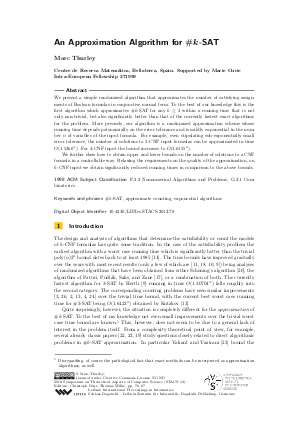An Approximation Algorithm for #k-SAT
Author Marc Thurley
-
Part of:
Volume:
29th International Symposium on Theoretical Aspects of Computer Science (STACS 2012)
Part of: Series: Leibniz International Proceedings in Informatics (LIPIcs)
Part of: Conference: Symposium on Theoretical Aspects of Computer Science (STACS) - License:
 Creative Commons Attribution-NonCommercial-NoDerivs 3.0 Unported license
Creative Commons Attribution-NonCommercial-NoDerivs 3.0 Unported license
- Publication Date: 2012-02-24
File

PDF
LIPIcs.STACS.2012.78.pdf
- Filesize: 0.52 MB
- 10 pages
Document Identifiers
Subject Classification
Keywords
- #k-SAT
- approximate counting
- exponential algorithms
Metrics
- Access Statistics
-
Total Accesses (updated on a weekly basis)
0PDF Downloads0Metadata Views
Abstract
We present a simple randomized algorithm that approximates the number of satisfying assignments of Boolean formulas in conjunctive normal form. To the best of our knowledge this is the first algorithm which approximates #k-SAT for any k>=3 within a running time that is not only non-trivial, but also significantly better than that of the currently fastest exact algorithms for the problem. More precisely, our algorithm is a randomized approximation scheme whose running time depends polynomially on the error tolerance and is mildly exponential in the number n of variables of the input formula. For example, even stipulating sub-exponentially small error tolerance, the number of solutions to 3-CNF input formulas can be approximated in time O(1.5366^n). For 4-CNF input the bound increases to O(1.6155^n). We further show how to obtain upper and lower bounds on the number of solutions to a CNF formula in a controllable way. Relaxing the requirements on the quality of the approximation, on k-CNF input we obtain significantly reduced running times in comparison to the above bounds.
Cite As Get BibTex
Marc Thurley. An Approximation Algorithm for #k-SAT. In 29th International Symposium on Theoretical Aspects of Computer Science (STACS 2012). Leibniz International Proceedings in Informatics (LIPIcs), Volume 14, pp. 78-87, Schloss Dagstuhl – Leibniz-Zentrum für Informatik (2012)
https://doi.org/10.4230/LIPIcs.STACS.2012.78
BibTex
@InProceedings{thurley:LIPIcs.STACS.2012.78,
author = {Thurley, Marc},
title = {{An Approximation Algorithm for #k-SAT}},
booktitle = {29th International Symposium on Theoretical Aspects of Computer Science (STACS 2012)},
pages = {78--87},
series = {Leibniz International Proceedings in Informatics (LIPIcs)},
ISBN = {978-3-939897-35-4},
ISSN = {1868-8969},
year = {2012},
volume = {14},
editor = {D\"{u}rr, Christoph and Wilke, Thomas},
publisher = {Schloss Dagstuhl -- Leibniz-Zentrum f{\"u}r Informatik},
address = {Dagstuhl, Germany},
URL = {https://drops.dagstuhl.de/entities/document/10.4230/LIPIcs.STACS.2012.78},
URN = {urn:nbn:de:0030-drops-34400},
doi = {10.4230/LIPIcs.STACS.2012.78},
annote = {Keywords: #k-SAT, approximate counting, exponential algorithms}
}
